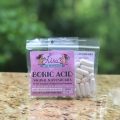
What is Sperm?
Sperm are male reproductive cells and are just one component of semen and a very important factor in reproduction. Semen is a greyish-white bodily fluid that is secreted by the male gonads. It carries sperm or the spermatozoa and fructose and other enzymes that help the sperm to survive to facilitate successful fertilization.
On average, a male produces approximately 73 million sperm cells per milliliter of ejaculate. Once an individual releases their sperm, they can live in the female vagina for up to 5 days.
On a dry surface, such as clothing or bedding, sperm are dead by the time the semen has dried. In water, such as a warm bath or hot tub, they’ll likely live longer because they thrive in warm, wet places. But the odds that sperm in a tub of water will find their way inside a woman’s body and cause them to get pregnant are extremely low.
What is boric acid?
Boric acid is a water-soluble compound containing oxygen, boron, and hydrogen. It’s a white substance that comes in powder or crystal form. Researchers believe boric acid has antifungal and antibacterial properties.
According to studies, boric acid was first used as a topical antiseptic by Lister in 1873. It has subsequently been used in eye washes, mouthwashes, skin powders and ointments. Boric acid has also been used as an irrigant for body cavities, including the pleural space, vagina, and rectum.
Diluted boric acid may be used to treat skin conditions like diaper rash, insect bites, athlete’s foot, foot odor, and yeast infections. In this article, we shall be looking at how boric acid interacts with sperm cells.
Does Boric Acid Kill Sperm cells?
No, studies have shown that even though acute exposure of sperm cells to boric acid can adversely affect spermiation and sperm quality, these effects are readily reversible.
Using boric acid as a contraceptive will not prevent pregnancy. In fact, the use of boric acid as a form of birth control may cause harm to an unborn child and may impair fertility in some women.
In addition, using boric acid and other forms of contraception like condoms or diaphragms may damage the barrier and cause them not to work properly.
The best way to kill sperm cells is by using a kind of birth control known as Spermicide. The root word “cide” in “spermicide” means “to kill.” Spermicide doesn’t actually “kill” sperm, but it slows it down so it can’t reach an egg.
Spermicide comes in many different forms: creams, gels, film, foams, and suppositories (soft inserts that melt into a cream inside your vagina). It contains chemicals that stop sperm from reaching an egg. You put it in your vagina before sex to prevent pregnancy.
You don’t need a prescription to get spermicide — you can buy it over-the-counter at most drugstores, pharmacies, and superstores in the condom aisle. It is important to note that using boric acid with vaginal spermicides can decrease its effectiveness and also prevent them from working properly.
Boric Acid Side effects
Common side effects of Boric acid are:
- Vaginal discomfort
- Mild burning sensation after inserting a capsule
- Watery vaginal discharge
- Hives
Some of the serious side effects of Boric Acid are:
- Fever
- Nausea
- Vaginal bleeding
- Blood vessel disorder
- Redness in the vaginal area
Precautions
Before taking this medicine talk to your doctor if you’re allergic to it or are having any of these problems:
o Pain or tenderness in the pelvis or lower stomach
o Fever or nausea
o Vaginal bleeding
o Pelvic inflammatory disease
o Heart disease
o Poor immune system
o Blood vessel disorder
Before taking this medicine talk to your doctor if you’re having any allergies or taking any kind of prescription, non-prescribe, or any herbal products.




